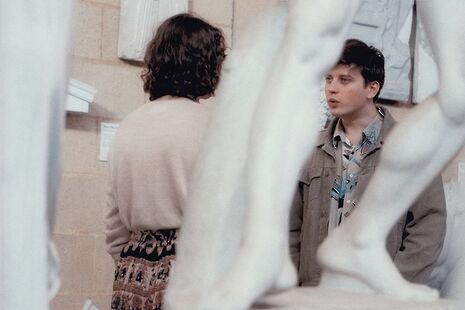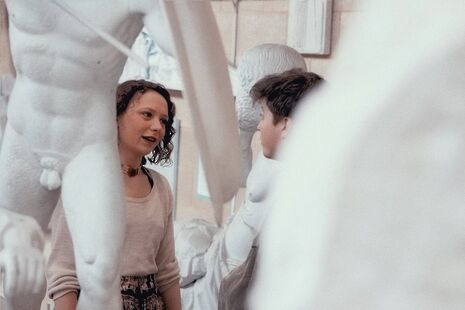When realism met romcoms: The Shape of Things
Low-rise jeans? Check. Dido? Check. Moral relativism? Check. Peter Chappell finds out more about the Week 7 main show

I’d never been to Newnham before so Clara van Wel met me at the Porters Lodge, and led me over the manicured lawns at about dusk. I ask her about Neil LaBute, who wrote the play that I’ve come to discuss. “People often describe him as a misanthrope,” she says, “but I think he would say he’s a realist.”
“I suppose that's what a misanthrope would say”, I say.
Opening a door, climbing some stairs, waving to a friend, she considers: “yeah, maybe he’s also a kind of a bit of a wanker.”
I had assumed we were en route to a rehearsal space, but what we arrived at was a cluttered students social room. On the old sofa was Beth Hindhaugh, sitting quietly, resting her head on her hand. Beside her, George Booth-Clibborn, guffawing loudly. Next to him was Adam Mirsky with his arms on the floor, feet on the sofa cushions, laughing, and Katurah Morrish, with her left eyebrow raised, in skeptical photographic stillness.
Sitting on a chair opposite her assembled cast, Clara eagerly started telling me more. The Shape of Things follows two relationships in America in the early 00s: Adam (Mirsky) and Evelyn (Morrish) are in a relationship; Jenny (Hindhaugh) and Phillip (Booth-Clibborn) are engaged. “Evelyn starts to subtly change things about Adam,” explains Clara, “and over the course of the play you start to think 'oh is that an ok for someone to change?' It starts with little things - haircuts then contact lenses and eating better…” But the relationship between Evelyn and Adam isn’t exactly what it seems.
Morrish, leaning forward, says that LaBute “plays with the idea that morality is a construct just like everything else. Evelyn is this kind of edgy, intriguing arts student…” — the cast laugh at the similarities with Morrish herself — “…and simultaneously we have Jenny and Phillip who are our engaged couple, who are Adam’s friends.”
“The play is a subversion of the cliched romcoms of the early 00’s”
“Who are not edgy!”, interjects Hindhaugh. Her and Booth-Clibborn explain that Evelyn’s actions start a chain of events which involve infidelity and the breakdown of the characters’ romantic relationships. The play is a subversion of the cliched romcoms of the early 00’s. I asked Clara what what first attracted her to LaBute’s script.
“I read it and thought it was a bit rogue. Some of them (LaBute’s plays) hit the mark and some of them are just very, very odd. He tends to play with small towns and relationships, and how people seem to inevitably betray each other. And the they way that people are morally flawed.”
“He is not at all condemning these characters. You don’t feel an authorial voice saying ‘what she did was very wrong and she is the villain in this’.”
“Evelyn is really interested in subjectivity, and also really interested in humanity. She can completely see what society is like and why people have these opinions, but she’s trying to make people see that everything they see is a construct, and that these ethical codes that everyone seems to share are just fantasy. She’s written very sensitively.”

Mirsky responds to Morrish’s point about morality in the play. “When I read it, I immediately sided with Adam the entire time. Adam’s moral code is warped during the play. But, like, he fucks up on normal things and it’s wrong and it’s bad; but you can identify with him. But the things that Evelyn does wrong do exist on a completely different plane.”
The complicated morals are “the reason why the end of this play is such a playground for actors. It’s just a fun thing for me and Adam (Mirsky) to do because the closing scene is like a showdown scene, where my characters idea of society conflicts with his, and it’s very much a tug-of-war for the audience’s sympathy.”
Clara agreed: “I don't want people to feel is that Evelyn is the villain and that Adam is the victim, and that’s all easy. Then I want them to be unsure as to who is the moral victor. Ambiguity, I think, is what I would like them to feel. That sort of ‘oh, I don’t really know how I feel’ feeling.”
I asked Clara why she chose the Corpus Playroom for The Shape of Things. “I like how it has that framing quality, so as to seem as naturalistic as possible and the sense that you are uncomfortably being a voyeur into these peoples lives. It’s natural, but something’s wrong. Evelyn functions as a stage manager within the play, and the sets that work the best in Corpus are when one or two items of furniture are easily repurposed.”
I leave down Sidgwick Avenue intrigued at this cerebral play, written at the cusp of the social media revolution we are currently living through, where our lives can be constantly edited, improved, manicured. Van Wel’s production feels slick, prescient and contemporary.
The Shape of Things runs from Tues 7th - Sat 11th March at the Corpus Playroom, 7pm
 News / SU reluctantly registers controversial women’s soc18 December 2025
News / SU reluctantly registers controversial women’s soc18 December 2025 Features / Should I stay or should I go? Cambridge students and alumni reflect on how their memories stay with them15 December 2025
Features / Should I stay or should I go? Cambridge students and alumni reflect on how their memories stay with them15 December 2025 News / Dons warn PM about Vet School closure16 December 2025
News / Dons warn PM about Vet School closure16 December 2025 News / Cambridge study finds students learn better with notes than AI13 December 2025
News / Cambridge study finds students learn better with notes than AI13 December 2025 News / Uni registers controversial new women’s society28 November 2025
News / Uni registers controversial new women’s society28 November 2025









